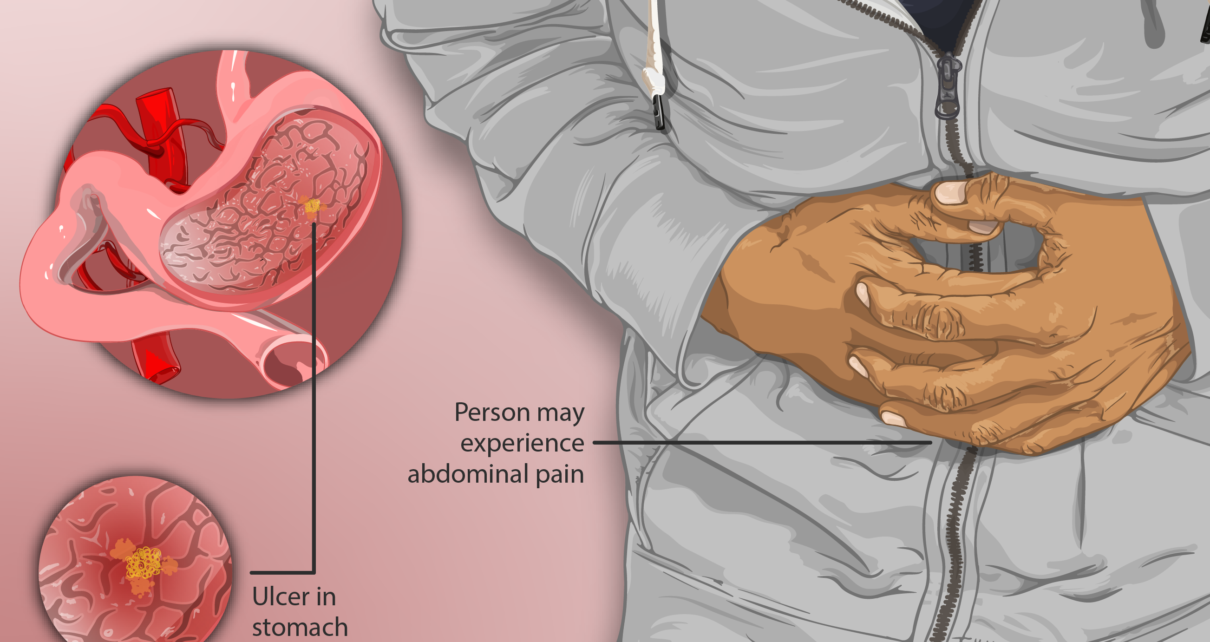To help in food digestion and fight against microbes, the stomach produces a potent acid. The stomach additionally secretes a thick coating of mucus to shield the body tissues from this acid.
Acid can damage stomach tissue, leading to gastric ulcers, if the mucus layer becomes worn down and ceases to function properly. Although stomach ulcers are usually treatable, if left untreated, they can be very problematic.
On this page, you will learn about basic information about gastric ulcers including their symptoms, causes, treatments and prevention. So, take a moment and read the following details.
What Is Gastric Ulcer?
A gastric ulcer, also known as a stomach ulcer, is a sore or lesion that develops in the lining of the stomach. This can happen when the protective mucus layer that lines the stomach is weakened or damaged, allowing stomach acid to erode the tissues underneath.
Gastric ulcers can cause a variety of symptoms, including abdominal pain, bloating, nausea, vomiting, and loss of appetite. In some cases, they may also cause bleeding or perforation of the stomach lining, which can lead to serious complications.
Causes Of Gastric Ulcer:
Generally, there are several potential causes of gastric ulcers. Here are some of the most common:
- Infection with Helicobacter pylori.
- Nonsteroidal anti-inflammatory drugs.
- Excessive alcohol consumption.
- Smoking tobacco.
- Stress and depression.
- To eat unhygienic food.
- Genetics issues.
- Other medical conditions.
Best Treatments For Gastric Ulcer:
It is important to consult with a professional doctor if you suspect you have a gastric ulcer. They can help to determine the underlying cause and develop an appropriate treatment plan. Otherwise, The treatment for gastric ulcers depends on the underlying cause and the severity of the ulcer. Here are some of the most common treatments for gastric ulcers:
Medications:
Proton pump inhibitors (PPIs) are often used to reduce the amount of acid produced in the stomach and promote the healing of the ulcer. H2 receptor blockers, such as ranitidine, are another type of medication that can reduce stomach acid production. Antibiotics may be prescribed if the ulcer is caused by an H. pylori infection.
Endoscopy:
An endoscopy procedure can be used to diagnose and treat gastric ulcers. During an endoscopy, a thin tube with a camera is inserted into the stomach, allowing the doctor to examine the ulcer and perform treatments such as applying the medication directly to the ulcer.
Lifestyle changes:
Avoiding alcohol, smoking, and NSAIDs can help to reduce the risk of developing gastric ulcers. Eating a healthy diet and managing stress can also help to promote the healing of the ulcer.
Surgical Treatment:
In rare cases, surgery may be necessary to treat a gastric ulcer that does not respond to other treatments. Surgery may involve removing the ulcer, repairing damaged tissue, or removing a portion of the stomach.
How To Prevent It In The Future?
There are several steps you can take to help prevent gastric ulcers in the future:
- Avoid triggers: Avoiding foods that irritate the stomach, such as spicy or acidic foods, and avoiding alcohol and smoking can help prevent gastric ulcers.
- Limit NSAID use: If you need to take NSAIDs for a chronic condition, talk to your doctor about the risks and benefits of these medications. They may recommend an alternative medication or a lower dose of NSAIDs.
- Manage stress: Stress does not directly cause gastric ulcers, but it can exacerbate symptoms. Practicing stress management techniques, such as meditation or deep breathing, can help reduce stress.
- Eat a healthy diet: Eating a diet rich in fruits, vegetables, and whole grains can help promote a healthy digestive system and reduce the risk of developing gastric ulcers.
- Take medications as prescribed: If you are prescribed medication to reduce stomach acid production, take them as directed by your doctor.
- Regular medical check-ups: Regular check-ups with your doctor can help to identify any potential risk factors for developing gastric ulcers and address them before they become a problem.
What Happens If It Doesn’t Treat On Time?
If left untreated, gastric ulcers can lead to several complications, some of which can be life-threatening. Here are some of the potential complications:
- Gastric ulcers can cause bleeding in the stomach, which can lead to anaemia or even shock if the bleeding is severe.
- In some cases, the ulcer can create a hole in the stomach or small intestine. This can cause severe abdominal pain and lead to life-threatening infections.
- If the ulcer is located near the opening of the stomach or small intestine, it can cause an obstruction, which can prevent food from passing through the digestive system.
- It can cause scarring in the stomach, which can lead to a narrowing of the digestive tract and make it difficult to swallow.
Note to Remember – It is important to seek medical attention if you suspect you have a gastric ulcer or are experiencing symptoms such as abdominal pain, bloating, nausea, vomiting, or loss of appetite. With prompt and appropriate treatment, the vast majority of gastric ulcers can be successfully treated and complications can be avoided.
The Bottom Line!
Therefore, anyone who suspects they could develop a stomach ulcer should visit Us. They will examine your condition and recommend a suitable treatment. Evaluation and treatment are required for any stomach symptoms that last for more than a few days or occur often. So, don’t wait and get your appointment right away!


